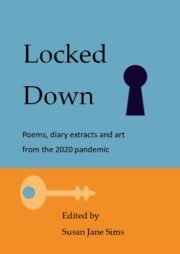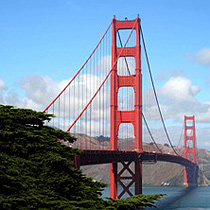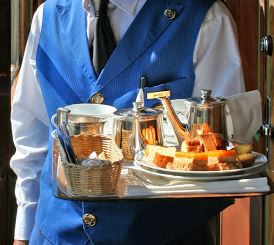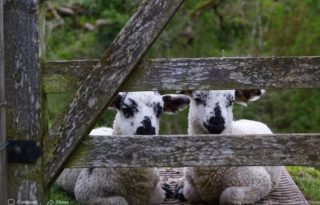
• Archive of all Poetry Space showcases
Guest Editor- Pam Zinnemann-Hope
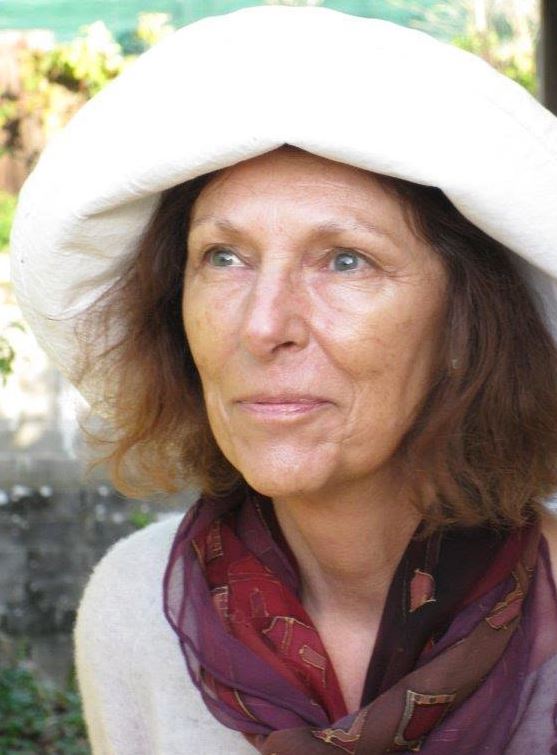
Pam Zinnemann-Hope’s first collection, On Cigarette Papers, was shortlisted for the Seamus Heaney Centre Prize & adapted by her for The Afternoon Play on BBC Radio 4, in which she also acted, alongside Eleanor Bron, Greg Wise, Emma Fielding et al. The poems tell of her parents’ escape from Nazi Germany and begins with the discovery of ‘fifty pencilled recipes / on cigarette papers, in Russian’. The story ranges across Europe, from Hitler’s Germany through imprisonment in the Stalin Purges to England where her parents were interned on the Isle of Mann as ‘Enemy Aliens’. It ends in 1995.
Pam’s second collection, Foothold, travels through the seasons in West Dorset, through deep time, music and love in old age. Some poems have been set by the composer David Dubery & by Pam’s husband, Peter Hope. Pam is also a children’s author. From 2000 – 2014 she ran regular workshops in Dorchester, read to patients in the elderly care wards in Dorchester County Hospital & held a number of residencies. Currently she facilitates poetry seminars and curates poetry and music evenings at Sladers Yard in West Bay.
Pam’s selection for Summer Showcase 2019
To Arran
Come home now to the curlew’s call
across salt-stung moorland
and the river’s marshland,
to where waders bathe and feed:
dipping long beaks into sand,
into rain-blackened peat;
then rising, lamenting the leaving,
their calls bubbling, rolling
across wind-bleached wetlands.
Come home now under the eagle’s eye,
under a purple sky, over heathland
and mountainous highland,
to where merlins perch for their hunting,
flying low from their ledges,
their wilderness edges;
then weaving to snatch a pipit—
cries haunting steep crag-stacks—
over harebell and heather and homeland.
Come home to a whiskey’s warm welcome,
to the smiles of the island
gleaming back in bright glass,
where peat fires slow-glowing in hearths
burn up against darkness without.
Come home now to Eilean Arainn: to sit
in this heartland, singing & staying,
hearts soaring to toast new old friends,
voices rising to rival the songs of wild birds.
Hear the curlew, the merlin,
the ring of clear glass, the laughter,
the singing, the craic of the fire:
come home to sip music & magic in Arran.
Lizzie Ballagher
The Woman Sees A Reflection of Herself As A Teenager
I have resorted to the behaviour
of my lonely teens;
binge eating, cookies,
crisps, crackers and sweets.
I buy bags on the way
home, stuff my face.
I pretend I don’t see
people stare at me,
with disgust/pity
as I pop donut after
donut in my mouth.
I’ve caught myself
in the act of binging,
forcing the fourth cookie
in, recoiled as if
from a monster.
I have begun secret eating.
I bury pizza boxes,
empty crisp packs, fish
supper wrappers, tubs of
ice cream, at the bottom
of the rubbish bin.
I’m putting on weight
again, sizes gradually
creeping up, cutting off
labels so my partner can’t
see how big I’ve gotten.
I thought I could fill
the holes inside me.
I thought I could pretend
that sad, fat girl was
really dead, that I’d shoved
enough cakes down her
fat fucking face to shut her up forever.
Pamela Scott
Shane
At a bus-stop, huggling with a mate for warmth,
The obligatory can,
The cheap MP3, a bandaged hand,
Leg trailing like before;
For a few months we shared
Forced cameraderie weekly over cheap coffee
bought with change scrounged from some passer-by
In the metered warmth of a church hall.
Last time I saw him he was shambling
through a supermarket, leg trailing,
grimy as a coat, hair cropped, eyes beer-blurred.
Time before was when he made his bed in the church porch
And lay on it.
I closed the door against the cold.
Michael Docker
A Thousand Years
In a happier world,
I would have loved you for a thousand years.
A day with you could heal the shards of a hundred tears.
Time did freeze when I looked into your eyes,
On that hilltop under far red skies;
The world was quiet there,
And gone were all my fears.
Thomas Wan
Duffleman
He had a Paddington Bear look
a bit regimental
with navy-blue duffle,
horn toggles
hanging loose
until fastened
in the noose
of a leather loop
the well-ordered lines
of a substantial sort of man
but also one who would
give you a warm hug,
keep a cool head
when marmalade sandwiches
went missing, wield
his weight in a kerfuffle.
Sue Wallace-Shaddad
Haiku
He walks to keep warm
tonight in frost-white moonlight
I will kiss his lips.
Maureen Weldon
Repetition
I’ve returned to practising my words
But now they hurt,
They hook their fingers deep,
And no matter how much I tremor or shake
They don’t let go
I force those words out of my mouth
They sound so strange
So, I repeat them
Over
And over
And over again
I repeat them until
They lose any meaning they might have had
Sophie Zhu
Time Turns
Grey cloud shrouds the silent days
as we wait for the year to turn
gone is the busy sparkle, bustle
that turned our minds to joy.
No songs fill our wanderings
as we read the days away
or struggle to find that bargain
or bulb to lift our spirits high.
They have passed into the year
that’s quickly running out:
falling into history with its
joys and sorrows hung
as if their flitches by the fire
where the old year’s beard
sits for warmth, his time
is running out and regret
is lost as death approaches
and we turn to a new child.
Carolyn O’Connell
Lock Gates
January unlocks its pernicious flood
Of glacial light & slithering mud.
Subservient, the river slides
To the pull of a gravid moon at full in the west.
Hushed, brimming, it runs between fringed banks
As the first tide of the year drags out.
Canny after years of watching,
The lock-keeper knows the river’s moods.
He arrives bleary & drenched at dawn:
Weary under the sinking moon,
Straining, swearing, sweating,
To crank the gates of the lock.
Now the river rages, lifts grey fists
Against the gob-smacked air.
Bottles lacking messages (or ghostly ships)
Swivel & toss on the torrent. Over the tumult,
Air swirls in the blast sucked seaward, drawn down
As the Medway’s thousand voices clamour.
Unlocked, the river roars into another year.
Its thunder silences
Early walkers all along both towpaths
Who gawp: awestruck, mesmerised.
Then, at the world’s western edge,
The blue moon drowns itself in despair.
Lizzie Ballagher
Feast of Fiddles
I am one
I am many
melodies interwoven
as brave & bright
as any tapestry
inviting you to clap
tap stamp
I hurtle away without a hint
of mockery to call our clansmen
from their crags & highlands
I switch fizzing with song
puckish with laughter
bowing plucking every note
until you dance with me:
breathless rapturous in awe
& when you’re failing falling
can go no longer cry “enough!”
listen I compel you: hear my eloquence
my doubled strings my tripled voices
stop your toes & singing tongues
wait while I haunt you with gulls
birds that wheel & call along the estuary
sounding wild spaces over water
conjuring journeys journeys over waves & shores
until
prophet-like
a bard among folk
who once were strangers
I bring you
utterly to a stand
invoking then for you
changes of the mind or heart
healing tears
laments in valley days of mourning
& giddy effervescent joy
Lizzie Ballagher
General Comments by our guest editor Pam Zinnemann-Hope
It’s been a great pleasure to read all the submitted poems and it took me quite some time, over several days, to wrestle ten from the pile. But in the end these are the ten that I keep coming back to most. Another poet might have chosen differently.
I see poetry as a window onto our inner lives and preoccupations, as well as onto our ways of looking outwards and it has been a privilege to share the experiences of the poets and to see the different ways they have shaped them into poems. In the end I’ve chosen pieces that most fully spoke to me, this wasn’t always to do with subject matter, it also had to do with that difficult task of shaping that we all struggle with. There’s no one way to do this and I’ve enjoyed everyone’s approach who submitted.
Comments On Each Poem
To Arran
This poem opens in a particular voice, with a line that immediately speaks to us:
‘Come home now..’
and invites us to read on. It has a lovely, lilting music with much use of alliteration e.g. ‘Come…curlew… call’ and assonance e.g. ‘feed, beaks, peat, leaving’. The use of ‘Come home’ as a refrain is very effective in building its songlike quality and its tone of longing. I particularly like the repetition of ‘under’ and full rhyme in
‘under the eagle’s eye/ under a purple sky’. And the repeated h’s and the full rhymes in:
‘heathland/ highland/ homeland’.
The poem is full of great imagery of the different birds and different terrains of the island, in language both spare and clear. Towards the end there is the lovely Scottish word ‘craic’, which adds to spirit of place so well evoked in this poem.
The Woman Sees A Reflection of Herself As A Teenager
This is a brave, confessional poem and it works well because it is also a well- made piece of writing. It’s hard to do with this kind of subject matter but the poet takes us with her on her journey of over-eating right through to the anger with herself at the forceful, moving ending. The title is long and broad, in contrast to the poem itself, which is long and thin – perhaps the shape the poet wants to be! The language is spare and rhythmic and the line endings are just right.
I like the two, tiny, italicised, indented sections, they are like whispers to the reader. Each stanza begins with an ‘I’ statement and there is a progression in each stanza to a different thought or action, until the last 2 stanzas when ‘I thought’ is poignantly repeated. The straightforward, spare language and tone, which is controlled, make this a very moving piece.
Shane
This poem has a very immediate affect on us. We are straight in at the bus stop with no introductions and we can feel the cold and Shane’s need for warmth. I like the word ‘huggling’ in the first line. I’m not sure but I think it may be dialect, it certainly feels right for this character. Immediately we have a pretty good idea that this is an alcoholic and a rough sleeper. I think the description is a particularly good example of how ‘show, don’t tell’ can really do its job and the almost rhyme of ‘can’ and ‘hand’ adds poignancy.
In the second stanza we learn about the poet’s past ‘forced camaraderie’ with Shane. I may be wrong but I get the impression that the poet was down on their luck for a while as the cheap coffee was
‘bought with change scrounged from some passer-by’.
There is ‘metred warmth’, perhaps during this episode, things are not so bad for Shane? But in stanza 3, the poet is now in a better place and Shane is not – the images of Shane are bleak – that ‘leg trailing’ and ‘eyes beer-blurred’ really stay in my mind.
A Thousand Years
This is a rather old-fashioned-seeming poem with two full rhymes – ‘…ears’ and ‘ies/eyes’. The first rhyme is repeated three times, including in the last line and the lines are short and few.
‘In a happier world’
seems to apply to the state of the world and also to the poet’s experience. It’s a very simple poem in the best sense. The language is fairy-tale like – ‘a thousand years’ & ‘a hundred tears’ and ‘far red skies’ – and this quality is what, for me, gives the poem its strength and makes it believable. It seems to be about a love that was not possible, or, even, perhaps a love that died. We are taken to that one beautiful moment when ‘Time did freeze’. There is a great sense of calm, as well as poignancy here and, because of the first line, there is a sense that the poet always knew that that perfect moment couldn’t last. Yet there is a sense in which it was a transforming moment:
‘And gone were all my fears.’ A beautiful ending.
Duffleman
This poem is in great contrast to ‘Shane’! It tells us about someone older, someone who is no longer alive – the ‘navy blue duffle’ suggests perhaps, the 1960s – as does the ‘Paddington Bear look’, which is an affectionate, old-fashioned image. We are looking back and observing. We see contrast, the Paddington Bear versus the next line,
‘a bit regimental’, which suggests someone rather buttoned up. There are part-rhymes with ‘duffle’ and ‘toggle’ and full rhymes with ’noose’ and ‘loose’ – two very contrasting words that echo the contrasting parts of this man’s nature. I think it’s these two parts of him that draws us, via the poet to feel affection – perhaps a restrained affection – for this man, who is probably a relative of the poet. A father? An uncle?
There are ‘well-ordered lines’ in the poem and in the man’s clothes. There is a ‘warm hug’ and a ‘cool head’. Paradox is what drives this piece, with its two stanzas of 8 short lines and a last line where ‘kerfuffle’ – an old fashioned word – rhymes with ‘duffle’. We get a strong sense of who this man was.
Haiku
This love poem, as its title suggests, adheres to the traditional haiku form of 5 – 7 – 5 syllables. In the first line we are introduced to the subject of the poem, the all-important ‘He’. There are two vowel rhymes here, in ‘walks’ and ‘warm’. In the second line the poem obeys the haiku tradition by evoking a season – here ‘frost white’ tells us that it’s winter. (We also know that it’s cold from the first line.) The whole of the lovely second line is full of internal rhymes: ‘tonight’, ‘white’, ‘moonlight’, with that long ‘i’ sound which is so good at giving a sense of deep winter cold. I particularly like the image of ‘frost-white moonlight’, it’s so economical and paints a clear picture for us. It’s also very romantic and leads us to line 3 which is full of anticipation and again has vowel rhymes in ‘kiss’, ‘his’, ‘lips’. You don’t have to rhyme in haiku but this poet has managed it beautifully. I’m not always keen on haiku but this is an example of how very well it can work and has completely wo me over.
Repetition
In poetry words are our tool, they’re what we use to communicate: words, pauses, line endings. Words are also what we use to talk to ourselves and Repetition is a kind of conversation with the self about the power of words and the reader is invited to be a witness. The first line of this poem might suggest that the poet is practising something they’ve written, or learnt:
‘I’ve returned to practising my words’, a great opening line.
We never learn what the words are but we learn that ‘now they hurt’. Did they have less power previously? We know that they are part of some kind of struggle,
‘They don’t let go’.
The poet seems to be feeling great anxiety or is, perhaps, struggling with substance abuse:
‘No matter how much I tremor and shake’
The language of the poem is direct and spare. The last part of the poem is concerned with repetition, with the three repeats of ‘over’ and two repeats of ‘repeat’. In the end, through this repetition, the words seem to lose their power, the spell, if you like, that they have had over the poet. The poem is a very effective look at the power of words and uses its words well!
Time Turns
‘Grey cloud’ opens this poem, setting the tone, along with the word ‘shrouds’, which brings a corpse to mind. It’s the time when
‘we wait for the year to turn’,
the dead days between Christmas and New Year and the poet is looking back on the recent ‘busy sparkle’, and they are reflecting on the year ‘that’s quickly running out’. There are three 4 line stanzas followed by two 3 line stanzas at the end, as though the diminishing number of lines echoes the running out of the year. The poet effectively evokes for us the attempts to ‘lift our spirits high’ during a time when,
‘No songs fill our wanderings’,
in this case, the wanderings are through shops. While the death of the old year is evoked, we also learn that the poet and others,
‘turn to a new child’. The child may be the young year but is probably also a new child in the poet’s life. We have a great sense that while there is death, there is also new life.
Lock Gates
What a great title! This is another poem about the year’s turning but here it’s January and the first tide on the Medway. The river is the main character in this piece and its flow is controlled by the gates. At first it is ‘subservient’, it’s ‘hushed and ‘brimming’
‘As the first tide drags out’
I particularly like the phrase ‘drags out’ which evokes just what water does when a tide is flowing, we can feel the drag of the water. The lock keeper ‘knows the river’s moods’ and we see that he has moods too – he’s ‘bleary’, drenched’ and ‘weary’. The first two of the four 6 line stanzas tell us of river, man and moon; the latter is first full, then sinking. In the last two stanzas the river ‘rages, lifts grey fists’ and its violence, once the lock gates have been opened, is beautifully drawn, with the sound effects of alliteration and assonance e.g.‘ blast sucked seaward, drawn down’. This is the main drama of the poem, the river ‘roars into another year’ but it’s the moon that closes the poem; it’s ‘blue’ and ‘drowns itself in despair’. The poet is telling us that all is not well. Maybe this is a personal despair, or maybe it is despair at the times we live in. We are left guessing.
Feast of Fiddles
This poem is written/spoken in the voice of the music. What a lovely angle to come from! The form perhaps represents the sounds in air, the rhythms and pauses of the music, the rhythms of the dancers’ feet. The idea of:
‘I am one’…. ‘I am many’ creates an intriguing opening, it invokes the voice of one or many instruments and we are drawn into the dance. The poet employs various devices to enhance the verbal music. ‘clap’… ‘tap’…’stamp’ are examples of the onomatopoeia used throughout and there is rhyme, or part rhyme here too, effectively moving the music of the poem along in the first part. There is also a lot of assonance, (‘clansmen’….’crags’) and alliteration, e.g. ‘failing falling’, which, again almost rhyme. Now the voice of the poem changes tack and slows, we are invited to ‘listen I compel you…’ and to ‘stop’. Next the music ‘haunts’ with images of birds and ‘wild places’. Lastly the music is, ‘a bard among folk/who once were strangers’, it unites us and, lastly it ‘invokes…changes of the mind or heart,’ it can both lament or bring ‘giddy effervescent joy’ – a lovely ending. The poet offers us music’s different moods and tells us of the ways in which it can touch us, and the poem does touch us:
‘and as he does so we feel its power’,the whole poem is like a dance.

